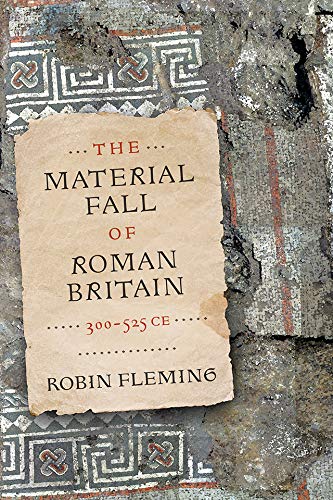

The Material Fall of Roman Britain, 300-525 CE
4.63(24 readers)
Although lowland Britain in 300 CE had been as Roman as any province in the empire, in the generations on either side of 400, urban life, the money economy, and the functioning state collapsed. Many of the most quotidian and fundamental elements of Roman-style material culture ceased to be manufactured. Skills related to iron and copper smelting, wooden board and plank making, stone quarrying, commercial butchery, horticulture, and tanning largely disappeared, as did the knowledge standing behind the production of wheel-thrown, kiln-fired pottery and building in stone. No other period in Britain's prehistory or history witnessed the loss of so many classes of once-common skills and objects. While the reasons for this breakdown remain unclear, it is indisputable the collapse was foundational in the making of a new world we characterize as early medieval.The standard explanation for the emergence of the new-style material culture found in lowland Britain by the last quarter of the fifth century is that foreign objects were brought in by "Anglo-Saxon" settlers. Marshalling a wealth of archaeological evidence, Robin Fleming argues instead that not only Continental immigrants, but also the people whose ancestors had long lived in Britain built this new material world together from the ashes of the old, forging an identity that their descendants would eventually come to think of as English. As with most identities, she cautions, this was one rooted in neither birth nor blood, but historically constructed, and advanced and maintained over the generations by the shared material culture and practices that developed during and after Rome's withdrawal from Britain.
Publisher
University of Pennsylvania Press
Publication Date
6/11/2021
ISBN
9780812297362
Pages
309
Categories
About the Author

Robin Fleming
Robin Fleming is a medieval historian, professor of history at Boston College, and a 2013 MacArthur Fellow. She is an accomplished writer of numerous books that focus on the daily lives and lifestyles of the people of England around the time of the Roman Empire and early medieval times. By working hand-in-hand with archaeologists she has been able to piece together details of their lives that may otherwise be overlooked.
When asked if she becomes emotionally invested in her research, she replied:
"Absolutely. I feel it’s my job to let people speak who have been forgotten and ignored. . . . It’s really hard in my period to get beyond kings and bishops and really . . . important people. But there were all these other people who had lives that were just as important. I want to speak for them."
Fleming received her B.A. and Ph.D. from the University of California, Santa Barbara in 1977 and 1984.[2] She has been the recipient of several awards honoring her groundbreaking research, from the following institutions: The Guggenheim Foundation, the Radcliffe Institute of advanced studies at Harvard University, the Bunting Institute for advanced study (1993–94), the Harvard Society of Fellows, and the National Endowment for the Humanities.
When asked if she becomes emotionally invested in her research, she replied:
"Absolutely. I feel it’s my job to let people speak who have been forgotten and ignored. . . . It’s really hard in my period to get beyond kings and bishops and really . . . important people. But there were all these other people who had lives that were just as important. I want to speak for them."
Fleming received her B.A. and Ph.D. from the University of California, Santa Barbara in 1977 and 1984.[2] She has been the recipient of several awards honoring her groundbreaking research, from the following institutions: The Guggenheim Foundation, the Radcliffe Institute of advanced studies at Harvard University, the Bunting Institute for advanced study (1993–94), the Harvard Society of Fellows, and the National Endowment for the Humanities.
Questions & Answers
Reader Reviews
Loading comments...